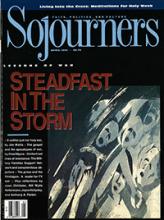There is a picture by Klee called "Angelus Novus." An angel is presented in it who looks as if he were about to move away from something at which he is staring. His eyes are wide open, his mouth agape, his wings are spread. The angel of history must look like that. His face is turned toward the past. Where a chain of events appears to us, he sees one single catastrophe which relentlessly piles wreckage upon wreckage, and hurls them before his feet. The angel would like to stay, awaken the dead, and make whole that which has been smashed. But a storm is blowing from Paradise; it has gotten caught in his wings, and it is so strong that the angel can no longer close them. The storm drives him irresistibly into the future to which his back is turned, while the pile of debris before him grows toward the sky. That which we name progress is this storm. -- Walter Benjamin
"In those days if anyone says to you 'Look! Here is the great leader!' or 'See! There he is!' -- do not believe it. For false leaders and false prophets will appear and produce signs and wonders, to lead astray, if possible, even the elect. But be on your guard; I have explained all this to you beforehand." -- Mark 13:21-23
THOSE OF US WHO had (admittedly naively) been hoping against hope that war would be averted will not soon forget the moment we heard the news of the launching of "Desert Storm." It landed in our gut hard and cold. The strained waiting and shrill deadlines over, the gale winds of war struck suddenly, driving us backward into a dark future. In that terrible moment, the aching sadness of Benjamin's "angel of history" seemed too difficult to bear.
Read the Full Article

